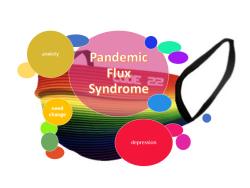After the vaccinations: pandemic flux syndrome

26 October 2021 - When the COVID-19 prevention measures got more relaxed due to the increasing level of vaccination this summer, many people also became more emotionally relaxed. But recently many people are starting to get different feelings: blunted emotions, spikes in anxiety and depression, and a desire to drastically change something about their lives. Does this sound familiar? You might experiencing “pandemic flux syndrome”. Especially if your are LGBTIQ.
Conflicting feelings
It is only a few months after the relaxation of the prevention measures, and in many countries the rate of infection is rising again. In many regions, the rate of vaccination lags behind. At the same time, more people are going out to concerts or to dinner, most students have returned to school, and many people return to their physical workplaces. In a mid-July poll by the US media network CBS News, 62% of US adults reported feeling concerned about the spread of the delta variant, but at the same time 52% reported feeling hopeful about the near future. This shows people have conflicting feelings and try to cope with the swings and mixed signals of threats, shifting public health policies and uncertain social behavior.
Psychological mechanisms
There are several psychological mechanisms at play.
- No fresh start: not having a clear moment for a “fresh start” has been shown to increase stress.
- Extended surg capacity: in emergencies, people rely on a “surge capacity”: a mental state that allows them to endure threats on the short term. But when the time this “surge capacity” is required becomes too long, it becomes too fatiguing for our brains; we can’t recharge enough.
- Affective forecasting errors: people tend to make mistakes in assessing how positively or negatively emotional they will be about special events. In the case of the epidemic, we may have been quite enthusiastic about meeting friends again, going out… but then the real experience was not always that special.
- Attempt to take back control: many people feel some emptiness, which brings discomfort, and discomfort can make us feel out of control. So they try to take back control, for example by making major life choices.
- The starting schism between people who are vaccinated or unvaccinated and people who are richer or poorer is likely to escalate in the future. Such social schisms will create further stress and exclusion.
Social psychologist Amy Cuddy and writer JillEllyn Riley have called the combination of these mechanisms “pandemic flux syndrome”.
Escape
Nidhi Tewari, a US clinical social worker, says: “People who tend toward anxiety might be experiencing strong urges to make major life changes; meanwhile, people who tend toward depression are feeling compelled to withdraw and shut down. Both reactions are grounded in the desire to escape.”
Research during the COVID-19 epidemic has shown that LGBTIQ people at average suffer from more anxiety and depression than the general population. In part this is due to real social and economic threats, and in part to their long history of exclusion and the related social apprehension. LGBTIQ people are at average poorer and have less steady social networks to support them. Discrimination at work and school makes them more vulnerable for discrimination, bullying and exclusion, and the epidemic clearly made these tendencies worse. So it can be expected that LGBTIQ will also suffer more from pandemic flux syndrome.
Research
GALE works with an international partnership to research these effects and to explore how LGBTIQ can be adequately supported during and after the COVID-19 epidemic. Do you want to support this effort – as LGBTIQ or as a provider of heath and well-being services? Please fill in the rainbosurvey!
Sources: Washington Post, LinkedIn, Samantha Young, Katelyn Merz on Mental Health in Flux, RAINBO project


